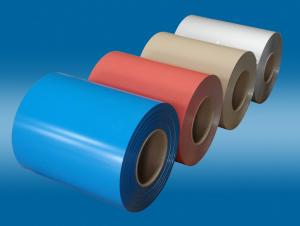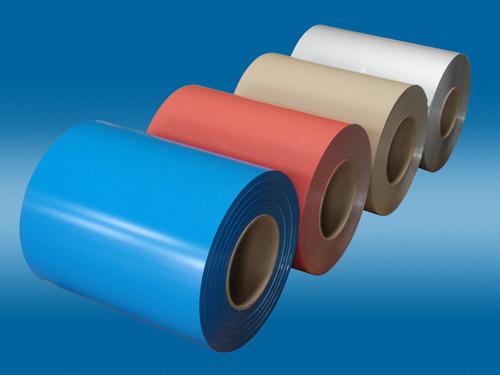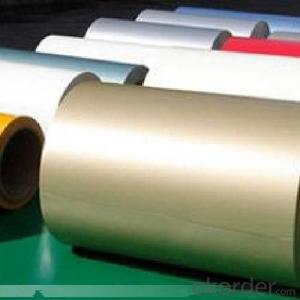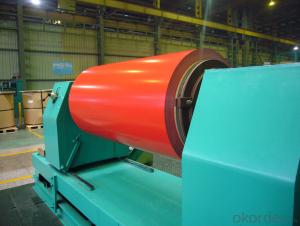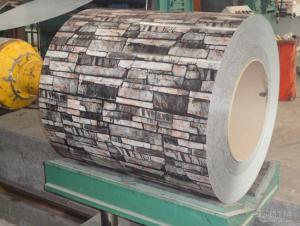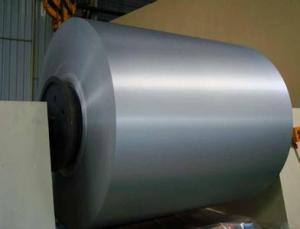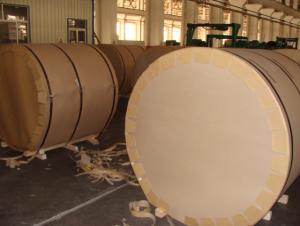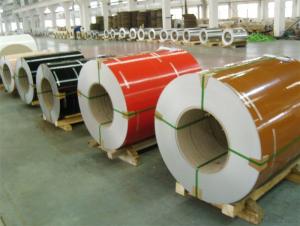PE COATED ALUMINIUM COIL- 1XXX
- Loading Port:
- China Main Port
- Payment Terms:
- TT OR LC
- Min Order Qty:
- -
- Supply Capability:
- -
OKorder Service Pledge
OKorder Financial Service
You Might Also Like
Product Description:
1 Specifications of PE Coated Aluminum Coil/Sheet
Alloy | AA1050,AA1060, AA1070, AA1100, AA3003, AA3004, AA3005, AA3105, AA5005, AA5052, AA5754, AA5083, AA8011 |
Temper: | H12, H14, H16, H18, H22, H24, H26, H32,HO, F |
Thickness: | 0.10-4.0mm |
Width: | 10mm- 2000mm |
Coating | PE(Polyester) |
Painting Thickness | Standard 16-25 microns, max 40 microns |
Color | Acording to Ral colors or customer’s samples |
Standard: | GB/T17748-1999, ASTM, ISO, EU standard |
Special Specification is available on customer’s requirement | |
PE(polyester) Coating
PE(polyester) coating:high molecular polymer as monomer and addition of alkyd, is an UV-resistant coating. It can be classified matt and glossy according to coating gloss. The compact molecule structure, makes paint surface luster and smooth,which assure good printing on the panel surface. With an warranty of 8-10 years for weather resistance, it is specially applied for internal decoration and sign board.
2 Usage/Applications of PE Coated Aluminum Coil/Sheet
Our company's PE Coated Aluminum Coil/Sheet have been widely used in the fields of construction and decoration(garage doors, ceiling etc.), electronic appliances, lighting decoration, air-condition air pipe, sanwich panels and drainage, etc.
- Q: How do aluminum coils contribute to the thermal conductivity of products?
- Aluminum coils play a vital role in enhancing the thermal conductivity of various products, thanks to their exceptional thermal properties. These coils, crafted from aluminum, excel at transferring heat with great efficiency. Compared to common metals like steel or copper, aluminum boasts significantly higher thermal conductivity. Consequently, when incorporated into products, aluminum coils swiftly and effectively move heat from one area to another. For instance, in air conditioning units, aluminum coils find frequent use in HVAC systems. As refrigerant courses through the coils, the aluminum material rapidly absorbs heat from the surrounding air. This process facilitates efficient cooling, swiftly removing heat from the air and expelling it, thereby creating a more comfortable indoor environment. Likewise, in heat exchangers, aluminum coils aid in the transfer of heat between two fluids or gases. The aluminum's strong thermal conductivity ensures efficient heat exchange, guaranteeing the desired temperature is reached promptly. Additionally, the lightweight nature of aluminum coils makes them easier to handle and install in a range of products. This characteristic proves particularly advantageous in industries such as automotive, aerospace, and electronics, where weight reduction is critical. In conclusion, aluminum coils make a significant contribution to the thermal conductivity of products by efficiently transferring heat, thanks to their impressive thermal properties. Furthermore, their lightweight nature enhances their versatility and practicality across multiple industries.
- Q: Are there any health risks associated with aluminum coils?
- There are some concerns about the potential health risks associated with aluminum coils. Aluminum is a common material used in the construction of coils for air conditioning and refrigeration systems. However, when aluminum comes into contact with certain acids, such as those found in some cooling agents and cleaning solutions, it can corrode and release aluminum ions into the air. Inhaling these aluminum ions may pose health risks, particularly for individuals with respiratory conditions or allergies. Additionally, there have been reports suggesting a potential link between aluminum exposure and certain health issues, such as Alzheimer's disease and breast cancer. However, scientific research regarding this connection is inconclusive and ongoing. It is important to note that aluminum is a naturally occurring element found in many foods, water, and even the air we breathe. It is also used in various consumer products, such as cookware and food packaging. To minimize potential health risks, it is recommended to ensure proper maintenance and cleaning of air conditioning and refrigeration systems to prevent the buildup of corrosive substances. Regularly changing air filters and using appropriate cleaning solutions can help reduce the risk of aluminum corrosion. Additionally, individuals with pre-existing respiratory conditions or allergies may consider consulting with a healthcare professional to determine any specific precautions they should take.
- Q: Can aluminum coils be used for signage purposes?
- Signage purposes can indeed utilize aluminum coils. Aluminum, as a lightweight and versatile material, finds common use in the signage industry. It possesses exceptional resistance to corrosion, rendering it suitable for both indoor and outdoor applications. Aluminum coils are easily cut and molded into diverse shapes and sizes, enabling the creation of customized signage designs. Moreover, aluminum exhibits high durability and can endure harsh weather conditions, ensuring longevity for signage. Coils can be painted or coated with various finishes to achieve desired aesthetics, while simultaneously safeguarding against fading and scratching. Ultimately, aluminum coils remain a favored choice for signage due to their versatility, durability, and aesthetic appeal.
- Q: This question asks for methods to determine whether an aluminum coil is new or old.
- <p>To determine if an aluminum coil is new or old, you can look for several signs: 1. Surface appearance: New coils typically have a clean, smooth surface without scratches or discoloration. 2. Packaging: New coils are usually well-packaged and protected. 3. Manufacturing date: Check for any labels or markings that indicate the manufacturing date. 4. Quality of the material: New coils should have consistent thickness and no signs of corrosion or wear. 5. Performance: New coils should perform as expected without any issues. If you're still unsure, consider consulting with a professional or the supplier for more information.</p>
- Q: Can aluminum coils be used in the production of electrical conductors?
- Yes, aluminum coils can be used in the production of electrical conductors. Aluminum is a highly conductive metal and is commonly used in various electrical applications due to its lightweight, cost-effectiveness, and excellent electrical conductivity.
- Q: How are aluminum coils transported and delivered?
- Aluminum coils have various transportation options, including road, rail, and sea. The choice of transportation depends on factors like distance, quantity, and urgency. For short distances, road transportation is common. Special trucks with flatbed trailers or coil carriers are used to securely transport the coils. These trucks have features like adjustable cradles or coil pads to prevent shifting during transit. Longer distances often involve rail transportation. Railcars can accommodate many coils depending on their size and weight. Rail transport is cost-effective and environmentally friendly for long-haul journeys. When coils need to be transported overseas or to another continent, sea transportation is preferred. Shipping containers protect the coils from potential damage. Cargo ships have the capacity and stability for long-distance transportation. Regardless of the mode of transportation, it is vital to handle aluminum coils carefully to prevent damage. Coils are protected from excessive vibration, impact, and adverse weather conditions. Tracking systems are used to monitor the location and condition of the coils during transportation. Overall, the transportation and delivery of aluminum coils require a well-coordinated logistics network to ensure timely and efficient delivery while minimizing the risk of damage.
- Q: What are the different pre-treatment methods for aluminum coils?
- Aluminum coils can undergo various pre-treatment methods to prepare their surface for further processing or coating. These methods serve different purposes and can be chosen based on specific requirements. One pre-treatment method is degreasing, which eliminates oils or greases on the coil surface. Solvents or alkaline cleaners are used for degreasing, depending on the application's needs. Etching is another pre-treatment method that removes surface oxides or contaminants from the aluminum coils. This can be achieved through acidic solutions or mechanical techniques like sandblasting or brushing. Phosphating, a commonly used pre-treatment method, involves applying a phosphate coating to the coil surface. This coating enhances adhesion for subsequent coatings or paints and provides corrosion resistance. Conversion coating is a popular pre-treatment method that forms thin layers of inorganic compounds on the coil surface. These coatings improve adhesion for subsequent coatings or paints and offer corrosion resistance. Common conversion coatings for aluminum include chromate, chromate-free, or anodizing. To summarize, the pre-treatment methods for aluminum coils include degreasing, etching, phosphating, and conversion coating. Each method has a specific purpose in preparing the coil surface for further processing or coating, chosen based on the application's requirements.
- Q: Are aluminum coils suitable for roofing?
- Yes, aluminum coils are suitable for roofing. Aluminum is a lightweight and durable material that is resistant to corrosion, making it an excellent choice for roofing applications. It is also highly reflective, which can help to reduce energy costs by keeping the building cooler. Additionally, aluminum coils are easy to install and maintain, making them a popular option for both residential and commercial roofing projects.
- Q: How do aluminum coils compare to copper coils in terms of performance?
- Aluminum coils and copper coils are two common types of heat exchanger coils used in heating, ventilation, and air conditioning (HVAC) systems. While both materials are effective in transferring heat, they do differ in terms of performance. Copper coils have long been the preferred choice for HVAC systems due to their superior heat transfer properties. Copper is an excellent conductor of heat, allowing for efficient transfer of thermal energy. This means that copper coils can cool or heat the surrounding air more effectively, resulting in faster and more efficient temperature control. On the other hand, aluminum coils are less efficient in terms of heat transfer compared to copper coils. Aluminum is a poorer conductor of heat, which means that it requires a larger surface area to achieve the same level of heat transfer as copper. Consequently, aluminum coils tend to be larger in size to compensate for their lower heat transfer capabilities. However, aluminum coils do have some advantages over copper coils. Firstly, aluminum is a lightweight material, making it easier to handle and install. This can be particularly beneficial in situations where weight restrictions or handling limitations are a concern. Secondly, aluminum coils are more resistant to corrosion compared to copper coils. Copper is prone to corrosion over time, especially in environments with high humidity or exposure to certain chemicals. Aluminum, on the other hand, naturally forms a protective oxide layer that helps prevent corrosion. This can result in longer-lasting coils and a lower likelihood of refrigerant leaks. In summary, while copper coils offer superior heat transfer capabilities, aluminum coils have their own advantages such as lighter weight and better corrosion resistance. The choice between aluminum and copper coils ultimately depends on the specific requirements of the HVAC system, including the desired performance, budget, and environmental factors.
- Q: Are aluminum coils compatible with other materials?
- Yes, aluminum coils are compatible with other materials. Aluminum is a versatile and widely used material that can be easily integrated with various other materials in different applications. For example, aluminum coils can be used in conjunction with copper tubing in air conditioning and refrigeration systems to enhance heat transfer efficiency. Additionally, aluminum coils can be coated or laminated with other materials such as polymers or paints to provide additional protection against corrosion, improve aesthetics, or enhance specific performance characteristics. Therefore, aluminum coils offer compatibility with a range of materials, making them suitable for diverse applications in industries such as construction, automotive, aerospace, and more.
Send your message to us
PE COATED ALUMINIUM COIL- 1XXX
- Loading Port:
- China Main Port
- Payment Terms:
- TT OR LC
- Min Order Qty:
- -
- Supply Capability:
- -
OKorder Service Pledge
OKorder Financial Service
Similar products
Hot products
Hot Searches
Related keywords
